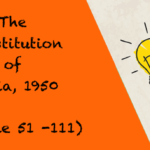The Constitution of India, 1950 (Article 152 – 212 )
THE STATES
Chapter I.—General
152. Definition.—In this Part, unless the context otherwise requires, the expression “State” does not include the State of Jammu and Kashmir.
Chapter II.—The...
The Constitution of India, 1950 (Article 112 – 151)
Procedure in Financial Matters
112. Annual financial statement.—(1) The President shall in respect of every financial year cause to be laid before both the Houses of...
The Constitution of India, 1950 (Article 51 -111)
PART IVA
FUNDAMENTAL DUTIES
51A. Fundamental duties.—It shall be the duty of every citizen of India—
(a) to abide by the Constitution and respect its ideals and...
The Constitution of India, 1950 (Article 1-50)
Preamble
WE, THE PEOPLE OF INDIA, having solemnly resolved to constitute India into a SOVEREIGN SOCIALIST SECULAR DEMOCRATIC REPUBLIC and to secure to all its...
Indian Constitution Synopsis for Competitive Exams
# Constitution of India:-
The Constitution of India or the Constitution of the Republic of India came in effect on January 26, 1950 and is...
Absolute Privilege and Qualified Privilege
Absolute privilege and qualified privilege are two legal concepts that provide protection against defamation claims. They are often invoked in situations where...
False imprisonment and Malicious prosecution
The difference between false imprisonment and malicious prosecution may be shown in the tabular form as follows:
False imprisonment.
Malicious prosecution.
1.
In the case of false imprisonment...
Justification and Fair Comment
Defamation is categorised as felonious tort meaning thereby it is civil wrong as well as crime . One can take both the...
Malice-in-fact and Malice –in-law
Distinction in the between Malice-in-fact and Malice –in-law may be shown in the following tabular form:
Malice-in-fact
Malice-in-law
1.
When an act...
Distinguish between Libel and Slander
A libel is the publication of a false and defamatory statement , in permanent form , tending to injure the reputation of...






















